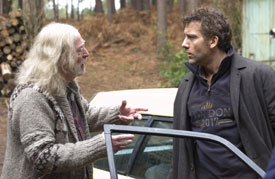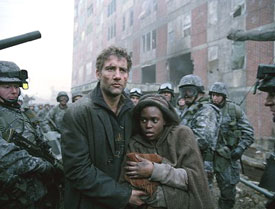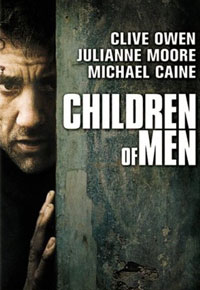The sustained long shots between jump-cuts give Children of Men (2006) an old-fashioned deliberately paced "British thriller" look, & the near future is close enough to how things were anywhere from 1968 to 1985 that at times it seems Children of Men might as well have been made contemporary to The Looking Glass War (1969). It's based on a mediocre science fiction novel by P. D. James, who makes an easily missed cameo appearance in a cafeteria scene.
 Then again, though attempting to be deadly serious, the fine cinematography does not make wooded backroads pass for the ruins of Dystopia, & there's just a little too much of The Bed Sitting Room (1969) in this view of the future imagined in Children of Men. Then again, though attempting to be deadly serious, the fine cinematography does not make wooded backroads pass for the ruins of Dystopia, & there's just a little too much of The Bed Sitting Room (1969) in this view of the future imagined in Children of Men.
Honestly, when things got their most horrific in Children of Men's idea of society's ruins, I kept half expected somebody to turn into a cupboard or a parrot; & Bed Setting Room remains a far better dystopian tale than "serious" bullcrap like this.
The unoriginality of the plot additionally reminded me of The Handmaid's Tail (1990), which was much better than this unintentional remake. The "uprising" war scenes toward the climax used the minimalism of Kubrik's Full Metal Jacket (1987) which itself looked like 1930s Europe rather than Viet Nam as pretended (it was literally Kubrik's back yard).
A note might be given as to the soundtrack. It is full of 1960s/70s songs, which enhances the sense that this film was actually made thirty or more years ago. The idea seems to have been that the near future is so mucked up that it can't come up with anything new & so is totally retro in its musical & fashion tastes. Not wanting even stuff from the year 2000, an aging population wants golden oldies. And that premise comes closer to working than does the film itself.
So we're asked to believe that the look of war in the near future will revert to what it looked like during the Blitz & that a government that wastes all its resources on oppression through its army will have no technology that wasn't available for waging war in WWII. In other words, never for a minute does this look like the future, nor even the present. At best it's Bed Setting Room meets Gorky Park (1983).
So here's the premise: Eighteen years before the story begins, the last baby on earth was born. He's just been murdered by a crazed fan, & the whole world, or what remains of it, is grieving its last child.
Parts of London seem to operate pretty much as always, thanks to that British stiff-upper-lip attitude. But the ghettos of London are in ruins, & at the fringe of the city are camps into which foreigners are rounded up. In the name of keeping terrorists at bay, a xenophobic totalitarian regime maintains a semblance of normalcy, while killing or arresting or deporting whoever rebels.
 The rebels are "all" foreign terrorists, according to the 209, an attitude that causes many of them to become terrorists indeed, though most are just surrogate Jews hunted down & sent to detention centers or deported or (implied near the climax) just taken off buses & executed death-camp style. The rebels are "all" foreign terrorists, according to the 209, an attitude that causes many of them to become terrorists indeed, though most are just surrogate Jews hunted down & sent to detention centers or deported or (implied near the climax) just taken off buses & executed death-camp style.
Our hero Theo (Clive Owen) is a furtive drunkard who just gets by within the system, an unhappy man who never recovered from the death of his own son Dylan twenty years earlier (before the universal loss of human fertility).
At that time in his past, grief drove him away from his wife Julian (Julianne Moore), but she's gotten in touch with him unexpectedly, needing his connections to get a transportation pass for Kee (Clare-Hope Ashitey), the first pregnant woman in eighteen years.
If the government finds out about Kee, they'll surely take her child from her, & put her god knows where to study as to why she alone is a fertile female. Julian's plan is to get her to the coast & to a boat that will take her to the semi-mythic Human Project, a supposed happy-smiley sanctuary.
The film gives us no reason to believe such a sancturay actually exists, but that's the goal, & the happy ending is all the more moronic because the likelihood of the Human Project being better than totalitarian Britain is never made the least plausible. Apparently, without evidence of any sort, we're to accept the happy-smily-town does exist beyond the sea.
A few of the character-actors at the fringe of the story seem to be able to drum up belief that they're in the totalitarian future, but the main players never do. We get a great miniature performance out of Michael Caine as old-time hippy Jasper, scoring perhaps his best death scene in any of his bazillion films.
Milenka James as Marichka the heroic gypsy woman with dog conveys the only character whose combination of ruination & courage felt truly born of the society postulated; she & Jasper stole every scene they were in, though stealing scenes from the tepid performers who populate the film couldln't've been too hard. And Clare-Hope Ashitey as preggers-girl manages to stay in character, such character as the limpid script permits.
Alas, the success of the piece hung on Clive Owen's shoulders, & he just can't drum up any belief in the setting, which has nothing about it to encourage an actor's belief. He fails to sell any of the premise to any viewer who is even moderately jaded or merely intelligent. Suckers, naifs, & stoned members of BAFTA who doused the film in awards might be duped into suspending disbelief. But for anyone who has ever read more than one science fiction novel, this is foolish stuff not even close to conviction.
There's really only two scenes that work. First is the death of Jasper is heroic with a sense of humor equal to the best bits in Bed Sitting Room. And when Theo in grief-stricken disbelief is driving away from the scene of Jasper's demise, an ever so faint flicker of a smile almost breaks the horrified misery of his expression. If Clive did that on purpose, it was a brilliant actorly moment, because Jaspar's ability to make jokes until the bitter end deserved a smile despite the tragedy.
The second scene that works is that passing moment when Theo, Klee, & the baby girl who was almost named Bazooka are clinging to one another & walking from the ruins of a building onto a war-torn street. All along their route the war comes to a quiet halt as for the first time people realize a baby exists in their world. They're like a Holy Family in Hell, whose light eases suffering souls. And as soon as they've passed through, the chaos of war picks up anew.
And if any other part of the film was even half this good, it might've been a great movie, or at least one that lived up to the well filmed long shots & fine editing style.
Instead, the effective "holy family" scene passes, everything is as it was before, & the film closes very rapidly thereafter with the ridiculous intimation that it is possible to get to Sanctuary by taking a little rowboat out in the sea & being picked up by a yacht of happy hopeful good guys (I was still not convinced the yacht club didn't intended to cook & eat the baby).
The assinine non-ending pretty much insured a fair-to-middlin' story was in the end rankly stupid. But it did make me want to see Bed Sitting Room again.
copyright © by Paghat the Ratgirl
|

 Then again, though attempting to be deadly serious, the fine cinematography does not make wooded backroads pass for the ruins of Dystopia, & there's just a little too much of The Bed Sitting Room (1969) in this view of the future imagined in Children of Men.
Then again, though attempting to be deadly serious, the fine cinematography does not make wooded backroads pass for the ruins of Dystopia, & there's just a little too much of The Bed Sitting Room (1969) in this view of the future imagined in Children of Men. The rebels are "all" foreign terrorists, according to the 209, an attitude that causes many of them to become terrorists indeed, though most are just surrogate Jews hunted down & sent to detention centers or deported or (implied near the climax) just taken off buses & executed death-camp style.
The rebels are "all" foreign terrorists, according to the 209, an attitude that causes many of them to become terrorists indeed, though most are just surrogate Jews hunted down & sent to detention centers or deported or (implied near the climax) just taken off buses & executed death-camp style.